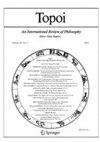德性伦理与道德体系
IF 1.3
2区 哲学
0 PHILOSOPHY
引用次数: 0
摘要
美德伦理学经常被标榜为伯纳德·威廉姆斯在他对“道德体系”的批判中指出的义务论和结果主义伦理学问题的补救方法。但是美德伦理在多大程度上可以避免这些问题呢?威廉姆斯对道德体系的批判对美德伦理学意味着什么?为了回答这个问题,我们就道德体系的组织目标——保护生命不受运气的影响——提供了一个更有原则性的特征描述。这表明系统是多重可实现的:相同的功能可以由本质上不同但功能等效的想法来实现。在确定了伦理思想作为道德体系必须满足的四个要求之后,我们表明,它们也可以被某些美德伦理思想星座所满足,其中包括著名的斯多葛主义。因此,我们证明了美德伦理道德体系提出的问题的可能性,类似于那些困扰其义务论和结果主义对应物的问题。这不仅扩大了威廉姆斯批判的范围,并带来了他对美德伦理遗产的警告;它还为当代道德伦理学家提供了一个更有原则的理解,即道德体系的功能特征,这些特征是道德体系问题的根源,从而帮助他们避免或克服这些问题。本文章由计算机程序翻译,如有差异,请以英文原文为准。
Virtue Ethics and the Morality System
Abstract Virtue ethics is frequently billed as a remedy to the problems of deontological and consequentialist ethics that Bernard Williams identified in his critique of “the morality system.” But how far can virtue ethics be relied upon to avoid these problems? What does Williams’s critique of the morality system mean for virtue ethics? To answer this question, we offer a more principled characterisation of the defining features of the morality system in terms of its organising ambition—to shelter life against luck. This reveals the system to be multiply realisable: the same function can be served by substantively different but functionally equivalent ideas. After identifying four requirements that ethical thought must meet to function as a morality system, we show that they can also be met by certain constellations of virtue-ethical ideas, including notably Stoicism. We thereby demonstrate the possibility of virtue-ethical morality systems raising problems analogous to those besetting their deontological and consequentialist counterparts. This not only widens the scope of Williams’s critique and brings out the cautionary aspect of his legacy for virtue ethics; it also offers contemporary virtue ethicists a more principled understanding of the functional features that mark out morality systems and lie at the root of their problems, thereby helping them avoid or overcome these problems.
求助全文
通过发布文献求助,成功后即可免费获取论文全文。
去求助
来源期刊

TOPOI-AN INTERNATIONAL REVIEW OF PHILOSOPHY
PHILOSOPHY-
CiteScore
3.10
自引率
7.10%
发文量
47
期刊介绍:
Topoi''s main assumption is that philosophy is a lively, provocative, delightful activity, which constantly challenges our received views, relentlessly questions our inherited habits, painstakingly elaborates on how things could be different, in other stories, in counterfactual situations, in alternative possible worlds. Whatever its ideology, whether with the intent of uncovering a truer structure of reality or of soothing our anxiety, of exposing myths or of following them through, the outcome of philosophical activity is always the destabilizing, unsettling generation of doubts, of objections, of criticisms. It follows that this activity is intrinsically a ''dialogue'', that philosophy is first and foremost philosophical discussion, that it requires bringing out conflicting points of view, paying careful, sympathetic attention to their structure, and using this dialectic to articulate one''s approach, to make it richer, more thoughtful, more open to variation and play. And it follows that the spirit which one brings to this activity must be one of tolerance, of always suspecting one''s own blindness and consequently looking with unbiased eye in every corner, without fearing to pass a (fallible) judgment on what is there but also without failing to show interest and respect. Topoi''s structure is a direct expression of this view. To maximize discussion, we devote most or all of this issue to a single topic. And, since discussion is only interesting when it is conducted seriously and responsibly, we usually request the collaboration of a guest-editor, an expert who will identify contributors and interact with them in a constructive way. Because we do not feel tied to any definite philosophical theme (or set of them), we choose the topic with absolute freedom, looking for what is blossoming and thriving, occasionally betting on what might - partly through our attention - ''begin'' to blossom and thrive. And because we do not want our structur e to become our own straightjacket, we are open to contributions not fitting the ''topos'', and do not rule out in principle the possibility of topic-less issues.
 求助内容:
求助内容: 应助结果提醒方式:
应助结果提醒方式:


